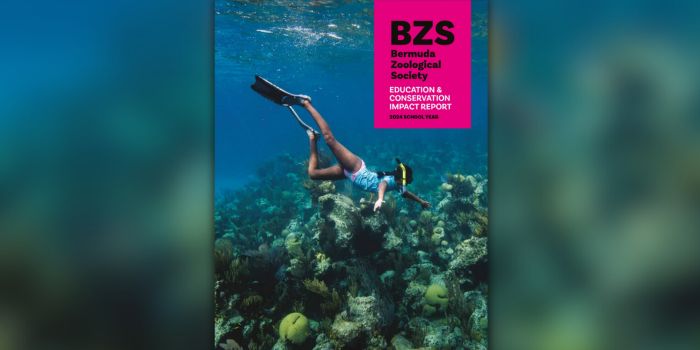Bermuda Zoological Society Releases Report
The Bermuda Zoological Society [BZS] has published its 2024 Community Impact Report, showcasing the organisation’s continued work.
A spokesperson said, “For nearly 50 years, BZS has blended science education with environmental stewardship to protect and restore island ecosystems. In 2024, BZS made a powerful and lasting impact through innovative STEM programmes, hands-on conservation efforts, and meaningful community engagement. From classrooms to coastlines, the following highlights showcase just some of the ways BZS is helping to build a stronger, more sustainable Bermuda: one classroom, one mangrove and one micro forest at a time.
BZS 2024 Impact Highlights
Empowering Young Minds Through STEM Education
“In 2024, the BZS Schools Programme delivered an impressive 8,730 student experiences, making it one of the largest nonprofit STEM education providers in Bermuda. The programme reached every public school on the island, along with several private schools and the Bermuda Homeschool Network. As the first Signature Learning Partner, BZS played a key role in co-developing a cutting-edge STEM curriculum and teaching at CedarBridge Academy. A total of 6,198 public school students and 2,532 private school students took part in dynamic, hands-on science learning.
Dynamic Programmes That Build Science Skills
“Students engaged with a range of exciting programmes tailored to different age groups and learning goals. BZS Ocean Education offerings included M2 Kids on the Reef, P2 Kids on the Beach, and S1 Food Webs. The BZS Living Classroom brought science to life through field-based learning for students from pre-school through senior school. Meanwhile, the GASS [Generating Academic Success in Science] programme, including the Introduction to Science and Engineering Practices [ISEP], supported science learning across all school levels with a focus on skill development and confidence-building.
Impressive Student Outcomes
“The impact of these programmes was clear in student outcomes. In 2024, 72% of P5 students showed gains in science knowledge, 77% improved their scientific literacy and 62% reported feeling more confident in their ability to do science. S1 students saw a 100% improvement in key science skills such as graphing, data interpretation and hypothesis writing. M2 students finished their programmes with a stronger appreciation for marine ecosystems, with 98% expressing strong support for ocean conservation. Across the board, BZS programmes not only enhanced understanding but also helped students believe in their ability to succeed in science.
Restoring Bermuda’s Ecosystems
Coastal Conservation: Reviving Mangroves
“The BZS continued its mission to protect and restore Bermuda’s island environments, with major progress made in coastal conservation. In 2024, more than 1,000 red and black mangroves were planted across Trunk Island, Riddles Bay and Hungry Bay. These restored ecosystems help stabilise shorelines, reduce erosion and create critical nursery habitats for young marine species like fish and crabs. These thriving mangrove ecosystems have also improved water quality by enhancing natural filtration, which in turn supports healthier surrounding seagrass beds. Over 2,700 mangrove propagules have also been raised in nurseries to support ongoing planting efforts. The Aspen-BZS Red Mangrove Project, backed by over 200 volunteer hours, demonstrated how community involvement can drive ecological recovery. The ongoing work of Aspen and the Trunk Island Weekend Warriors continues to move Bermuda closer to restoring its coastal habitats to their natural state.
Micro Forests: Reclaiming Native Landscapes
“The BZS Micro Forest Project is transforming how terrestrial restoration is done in Bermuda. Using the Japanese Miyawaki Method, and with the vision of Founding Donor RenaissanceRe, the support of Lead Partner HSBC and the continued support of our community partners, the project has now established 26 micro forest sites, covering 7,787 square meters and planting over 5,200 native trees and shrubs since 2021. These efforts boast a 92% plant survival rate, a strong indicator of long-term ecosystem health. The project combats the dominance of invasive species, replacing them with natives like Buttonwood, Jamaican Dogwood and rare plants such as Seven Year Apple and Yellowwood. With over 3,250 corporate volunteer hours and 2,000+ hours from dedicated Weekend Foresters, the community has played a vital role in this project. The BZS Micro Forest Project is not just restoring Bermuda’s natural heritage, it’s serving as a model for how science-led, community-driven restoration can create thriving, resilient environments.”
Philippe Bacon, BZS President said, “Inspiring young minds to explore, be creative and have fun while learning is at the heart of everything we do – and this year has been one of the most impactful yet for the BZS. From our record-breaking 8,730 young learner experiences to groundbreaking conservation and reforestation efforts, our 2024 Impact Report celebrates the progress we’ve made together. Thanks to the unwavering support of our members, donors and community partners, we continue to deliver transformative, hands-on programmes that spark curiosity and empower the next generation of scientists and conservationists. As we look ahead, I invite everyone to stay connected and proud of the difference we are making – for our youth, our island and our planet.”
The spokesperson said, “To read the full Impact Report, please download the document here.”
